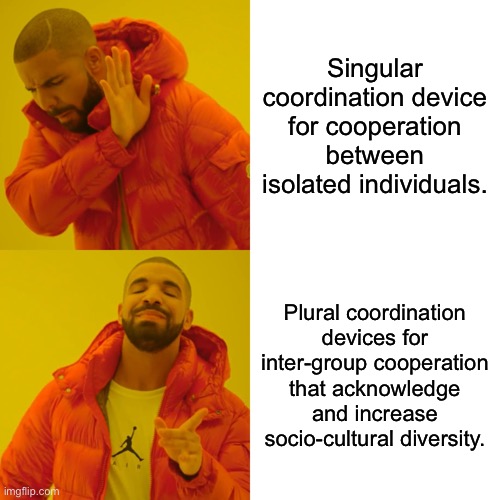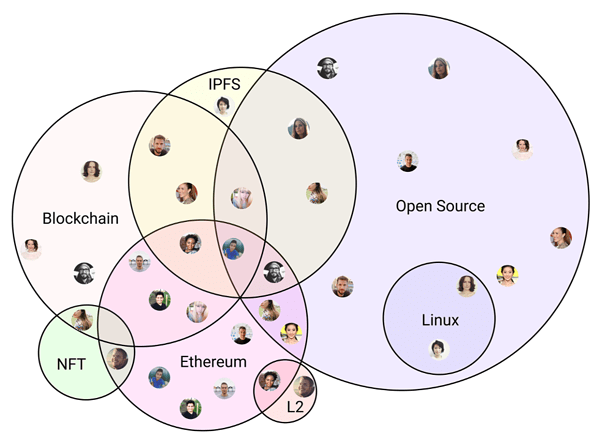There has been lots of work happening around Sybil resistance in Gitcoin. By way of background, creating multiple accounts by a single person is an apparent danger to Gitcoin Grants and quadratic funding. For example, a Sybil attacker could set up numerous profiles in the quadratic funding program. Then, split their funds between them to make many small contributions instead of one enormous contribution to the grants in their favor. Voilà, this is how they might get a disproportionately high reward from the quadratic matching fund. Indeed, to maintain the quadratic funding grants program, we need to detect and defend against fraud like this.
 More Complicated Potential Dangers
More Complicated Potential Dangers
We also need to consider more complex cases that might be dangerous for the overall utility of quadratic funding programs. We should build social technologies for Plurality — technologies that acknowledge the beauty and richness of our diversely shared lives. Social Plurality is about recognizing and fostering cooperation between various socio-cultural ecosystems. @GlenWeyl’s talk at the Schelling Point conference inspired the idea of applying the Plurality paradigm to quadratic funding and Gitcoin Grants.
Assume that these Plurality principles are critical. Then, we need to consider the role of these more complicated dangers to Gitcoin Grants, i.e., homogenous and highly cooperative groups within quadratic funding ecosystems. Consider families and friends, co-workers, neighbors, fellow citizens, for example. Naturally, our identities are nested within rich social graphs of relationships. Different people care about and cooperate with a unique set of people and organizations in their network. Should quadratic funding and Gitcoin Grants significantly reward and amplify cooperation between family members, co-workers, and friendly neighbors? Technically, a couple, a company, or a geographic community might be able to claim infinite amounts of matching funds through cooperation in Gitcoin Grants.

One of the early steps that Gitcoin took to cope with this reality was the adoption of pairwise quadratic funding computations. The key feature of this method is that it allows quadratic funding administrators to adjust the matching weights between any pair of contributors. In the spirit of Plurality, administrators can base these adjustments on recognitions about how much the contributors already cooperate. So, for example, two highly-cooperative agents would get a lower matching weight than two agents with very different social backgrounds. Yay: A formal mechanism for cooperation across differences! As far as I know, up until this point, the only evidence for collaboration between contributors that Gitcoin Grants captured is their contribution behavior in the current grants round, however. Unfortunately, it does not seem like this evidence sufficiently recognizes the complexity of the cooperative realities of contributors.
 Soulbound Token Journals
Soulbound Token Journals
Here are some thoughts on formalizing richer evidence for pairwise cooperation in an accountable and value-aligned manner. First, imagine that contributors would maintain personal journals with all sorts of soulbound attestations about themselves. So, for example, you’d get attestations for the grant rounds you participate in, the projects you contribute to, the GitHub organizations you work with, your Twitter followings, et cetera.
Rightfully so, the cyberpunks among us might be wondering at this point: What about privacy? Fortunately, we have a variety of applicable privacy solutions at our disposal.
For example, we can zip the journals with cryptography. Moreover, we can assess an account’s possessed attestations without identifying account information. Check out Vitalik Buterin’s post introducing the soulbound concept, where he details some of these privacy-related technicalities.
On the other hand, some people might even like to present specific attestations publicly. For example, many people in the Web3 community have profile picture NFTs and affiliate with the organizations they work with within their Twitter bios. Similarly, they might want to highlight some soulbound attestations in public.
Now, remarkably, administrators of quadratic funding programs like Gitcoin could query these soulbound journals to quantify the cooperation between contributors. Here is how a simple version of this could work by comparing the intersecting attestations in the journals of each pair of cooperating agents.
Suppose a pair of contributors, Alice and Bob, share two attestations relevant to the quadratic funding administrators. Further, suppose both have five relevant attestations in total. In that case, the quadratic funding administrators could quantify their cooperative multiplier as ⅖.
Next, feeding that result back into the pairwise quadratic funding computations, the matching weight for Alice and Bob could be approximated as ⅗, i.e., one minus their cooperative multiplier of ⅖. If the cooperation between two contributors would be super high, say a cooperative multiplier of one, this way (one minus one), their matching weight would be zero. In turn, if two contributors come from very different social ecosystems and don’t share any attestations, their matching weight could be 100%.
The above cooperative multiplier resulting from simple divisions of binary attestations is merely a kludge for a first start and not set in stone. One day, there might be a whole industry for further innovation dedicated to researching formal models to quantify the social distance of people. Ecosystems will need to keep iterating on the Plurality algorithms they apply as context and possibilities evolve. For the Gitcoin ecosystem specifically, I could see the Fraud Detection and Defense (FDD) workstream or a dedicated Plurality working group taking the lead here.
 Cooperation Across Differences
Cooperation Across Differences
In any case, with soulbound journals and tokens as more coherent evidence for pairwise cooperative relationships within the Gitcoin Grants ecosystems, we can significantly increase the Plurality of Gitcoin Grants. To the point, we’d gradually increase cooperation across differences and mute contributions between homogeneous and more highly cooperative groups. The whole execution of this process would be possible without manual surveillance as currently practiced by the human evaluators in the FDD workstream.
There are various possible mechanisms around the distribution of soulbound attestations. Attestations might be
- Free to claim or purchasable,
- Required for participation in, e.g., a grant round, or to contribute to a particular grant,
- Combinations of the above,
- Much more.
In any case, attestations might, on the one hand, represent a right to partake in governance and, on the other hand, might mean a liability when it comes to the matching weight calculations. Complex tradeoffs would determine the supply and demand for specific attestations. People would carry all sorts of attestations in their vaults. The value of their attestations would lie in the connections between them.
 Scaling Plural Technologies
Scaling Plural Technologies
Zooming out, we need to acknowledge that there won’t be a one-size-fits-all model to measure and apply social graphs to Plurality. So instead, let’s build a world where a Plurality of social institutions can query soulbound journals based on custom algorithms to assess and distribute rights and responsibilities to their people. The process might become a vital foundation for plural mechanism design across social organizations and mechanisms, including democracies, markets, the data economy, the commons, and identity. Research and development of identity and policy modules for Plurality might become a whole new business model for Gitcoin. For example, we might work with diverse ecosystems on grant rounds and, beyond quadratic funding, provide Plurality infrastructure for democratic, self-organizing communities more generally.
Notably, for example, as the infrastructure scales, it might help solve even some of the most significant technical issues of our time: e.g., Sybil-resistance, digital authentication, and more. Check out this piece on intersectional social data to learn more about some of these possible applications.
 Time to Build
Time to Build
In the meantime, some concrete next steps for Gitcoin might be the following:
- Model pairwise grants round matching based on “artificial” soulbound journals with the information we already have: e.g., IP addresses as attestations about location; grants round behavior; GitHub data; Twitter data; POAPs; DAO memberships; et cetera. Maybe the FDD workstream would be the best driver for these experiments. How about comparing different model results of plural funding with the actual GR13 results? @DisruptionJoe
- In working out the Grants 2.0 roadmap, we need to ensure the identity and policy modules are interoperable with these Plurality mechanisms and technologies. @kevin.olsen @lthrift
- Prototype and standardize soulbound journals. Maybe fork Gitcoin Kudos towards soulbound attestations? What mintkudos.xyz is up to related to soulbound Gitcoin Kudos seems highly relevant here. @keikumata
- Finally, we need to help Gitcoin and other social organizations to adopt soulbound journals and plural technologies for diverse cooperation. This work will require highly-interdisciplinary collaboration between researchers, engineers, educators, community builders and institutions, and more.
To learn more about the ideas described in this post, check out the presentation @GlenWeyl and I gave at a recent event organized by Protocol Labs.
I am super excited about the possibilities at the intersection of Gitcoin Grants, pairwise quadratic funding, and soulbound tokens. I hope we can work them out together. So join the discussion below, and let’s build a world where many worlds may fit.
I am deeply indebted to @GlenWeyl for his research and support, which guided the work on this post. My thanks are also due to @DisruptionJoe, @Fred, @kevin.olsen, @owocki, and Puja Ohlhaver for their suggestions and encouragement.
